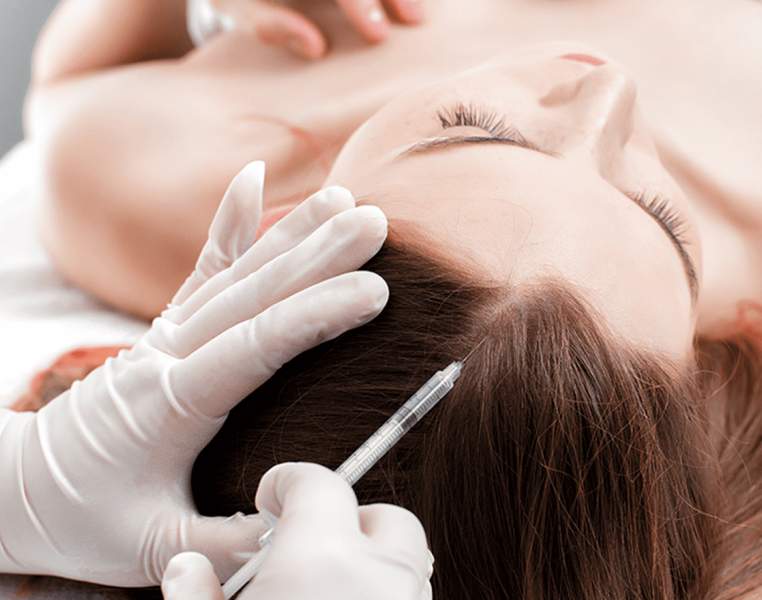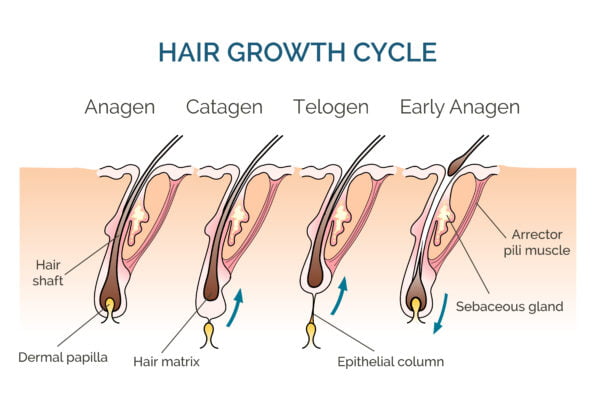Normal hair loss, also known as “Telogen Effluvium“, is a part of the hair growth cycle. It occurs when hair strands enter the resting phase, known as the telogen phase, and eventually fall out to make way for new hair. It’s important to distinguish this from abnormal hair loss, which can be a sign of underlying health issues.
Hair Loss of up to 100 hairs a day is completely natural. Well in all honesty you can’t count your every Hair coming loose, but you should watch in what quantity and when do they fall. Do you wake up and find a lot of your hair on your bed, or while having a bath do you notice hair falling in bunch? Such investigations on hair should be done regularly, and in case any doubt you should contact a Trichologist (A Hair Specialist) for advice.
If you have mild hair loss, you should just relax and improve your diet. You should eat food high in protein like eggs and meat. Also remember to include vitamins as they ensure smoother hair. And oil and shampoo 3 times in a week for men and 4 times for women.

Each hair follicle undergoes a continuous growth cycle, consisting of three distinct phases:
The active growth phase, typically lasting 2-6 years. During this phase, hair grows continuously from the root, known as the hair follicle.
A transitional phase lasting 2-3 weeks. Hair growth ceases, and the hair follicle detaches from the dermal papilla, the source of nutrients for hair growth.
The resting phase, lasting 3-4 months. The hair follicle remains dormant, and the hair eventually falls out. New hair follicles then enter the anagen phase, and the cycle repeats.

Stress is a common trigger for normal hair loss. It can disrupt the hair growth cycle and lead to more hair entering the telogen phase.
Your diet plays a significant role in the health of your hair. A lack of essential nutrients can cause hair to shed.
Fluctuations in hormones, especially during pregnancy or after childbirth, can lead to temporary hair loss.
Some medical conditions and treatments, such as chemotherapy, can lead to hair loss.
When understanding normal hair loss, understanding factors causing it should be studied first.
Normal hair loss can be identified by:
High levels of stress can contribute to hair loss. Managing stress through techniques like meditation, yoga, deep breathing exercises, or even regular exercise can help reduce hair loss. Stress reduction not only benefits your hair but also your overall well-being.
Regular Hair Care
Proper hair care, such as using a mild shampoo and conditioner, can help maintain a healthy scalp and hair. Regular, gentle brushing can also improve circulation to the scalp.
Consult a Professional
If you notice an unusual amount of hair loss or suspect an underlying issue, it’s a good idea to consult a dermatologist or healthcare professional. They can help determine the cause of your hair loss and provide appropriate treatment options.
When it comes to choosing the safest and most effective hair transplant option for the best hair growth results, don’t let cost be the only factor that stops you. It’s important to prioritize your long-term hair health.
At Hairfree Hairgrow, we’re here to address your concerns about hair loss. We take pride in being one of the top hair transplant clinics in India, with branches in Hyderabad, Surat, Pune, Kolkata, Gurugram, Ahmedabad, Bhopal, and Mumbai.
You can visit the Hairfree Hairgrow branch nearest to you, or give us a call at +91-7272832222. We’re committed to helping you achieve the best results and regain your confidence in your hair. Your journey to healthier, fuller hair starts with us.